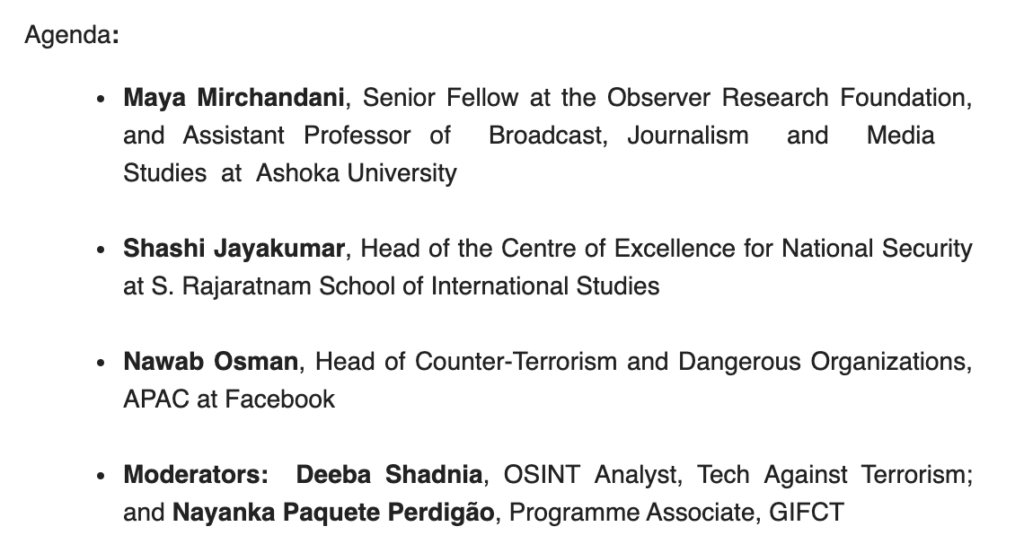| Our weekly review of articles on terrorist and violent extremist use of the internet, counterterrorism, digital rights, and tech policy. |
Tech Against Terrorism Updates
- Tech Against Terrorism is proud to announce its newest members Airbnb, Eventbrite, and Vimeo as joining us in our efforts to counter terrorist use of the internet whilst respecting human rights and freedom of expression. Airbnb has released a statement on their new membership, which you can read here.
 |
- We are hiring! We are looking for an open source intelligence (OSINT) analyst to join our team. For more information about the role and how to apply, see here.
- We have opened registration for the February TCAP Office hours. In these meetings, we provide an update on our development of the platform and answer any questions stakeholders might have. Please register for the event with your professional email here.
- This week our Director, Adam Hadley, has written an Op-Ed for The Times, in which he argues that the UK’s Online Harms framework is unlikely to help counter terrorist use of the internet and risks undermining key democratic principles like the rule of law and freedom of expression.
- We published a response to the open consultation regarding the Government of Australia’s Online Safety Bill. Read our full response here.
- Lastly, we also published a position paper on content personalisation and terrorist use of the internet, arguing that whilst algorithmic recommendation systems warrant scrutiny policy-makers should prioritise other actions – including improving designation and supporting smaller platforms – in order to tackle terrorism online. Read it here.
Top stories
- In response to Australia’s proposed new Media Bargaining law, Facebook has announced that it will restrict publishers and people in Australia from sharing or viewing Australian and international news content on their platform.
- Hope not Hate has published a report, State of Hate: Far-Right Extremism in Europe.
- The Indian government released a set of draft rules to regulate all forms of social media, news-related websites, and streaming services. Reports say that the guidelines comprise of a self-regulatory framework that contains a stringent particular code of ethics and regular compliance reports.
- The Combating Terrorism Center at West Point has published the February issue of CTC Sentinel, which features a profile on al-Qaeda’s possible next leader, an analysis of the evolution of the Boogaloo movement, as well as on the November 2020 Vienna attacker, and terrorism trends in Pakistan.
Read more about Australia’s online regulation laws and what they mean for tech companies in our Online Regulation Series’ blog post on Australia.
To read more on India’s online regulation, see our blog post from the Online Regulation Series on India.
Tech Policy
- Turkey’s Free Speech Clampdown Hits Twitter, Clubhouse -- But Most of All, The Turkish People: Katitza Rodriguez and Danny O’Brien argue that while it is the major tech companies who are meant to face legal sanctions and service interruptions under Turkey’s Social Media Law, the country’s citizens risk suffering the same consequences. Examples raised by the authors include slower Internet services, navigated cowed social platforms, or physical arrest for speaking out certain criticisms. (Rodriguez and O’Brien, Electronic Frontier Foundation, 16.02.21).
- This week we’re listening to Techdirt Podcast Episode 270: Regulating The Internet Won't Fix A Broken Government, in which Heather Burns from the Open Rights Group discusses the UK’s online harms framework as well as the expectation that intermediary liability can substitute for a social safety net.
You can read more about this law and what it means for tech companies in our Online Regulation Series’ blog on Turkey.
Far-right Extremism and Terrorism
- How an Encrypted Messaging Platform is Changing Extremist Movements: This piece, by Hannah Gais and Megan Squire, discusses the encrypted messaging platform Telegram and its use by and appeal to extremists. They argue that the platform’s technical features enable extremists to effectively spread propaganda and facilitate recruitment. Gais and Squire also analyse the platform’s role in the neo-Nazi accelerationist network as well as the platform’s non-compliance with its own Terms when it comes to right-wing terrorism. (Gais and Squire, Southern Poverty Law Center, 16.02.2021).
Islamist Terrorism
- Hezbollah Is Vulnerable. Lokman Slim’s Assassination Proves It: This article, by Hanin Ghaddar, sheds light on the consequences of Lokman Slim’s – a political activist and open critic of Hezbollah – assassination, and how it sends a message to local critics and activists as well as tests the limits of the international community. Ghaddar writes that in order to make sure Lokman Slim’s achievements and breakthroughs within the Shiite community do not go to waste, the international community, –particularly the Biden administration and the French government – must draw clear red lines, or the group will escalate its campaign of terror. Ghaddar stresses that anti-corruption and terrorism sanctions should not stop but rather "pick up pace and target a wider range of corrupt political figures from all sects and parties”. (Ghaddar, Foreign Policy, 16.02.2021).
| For any questions, please get in touch via: contact@techagainstterrorism.org |


